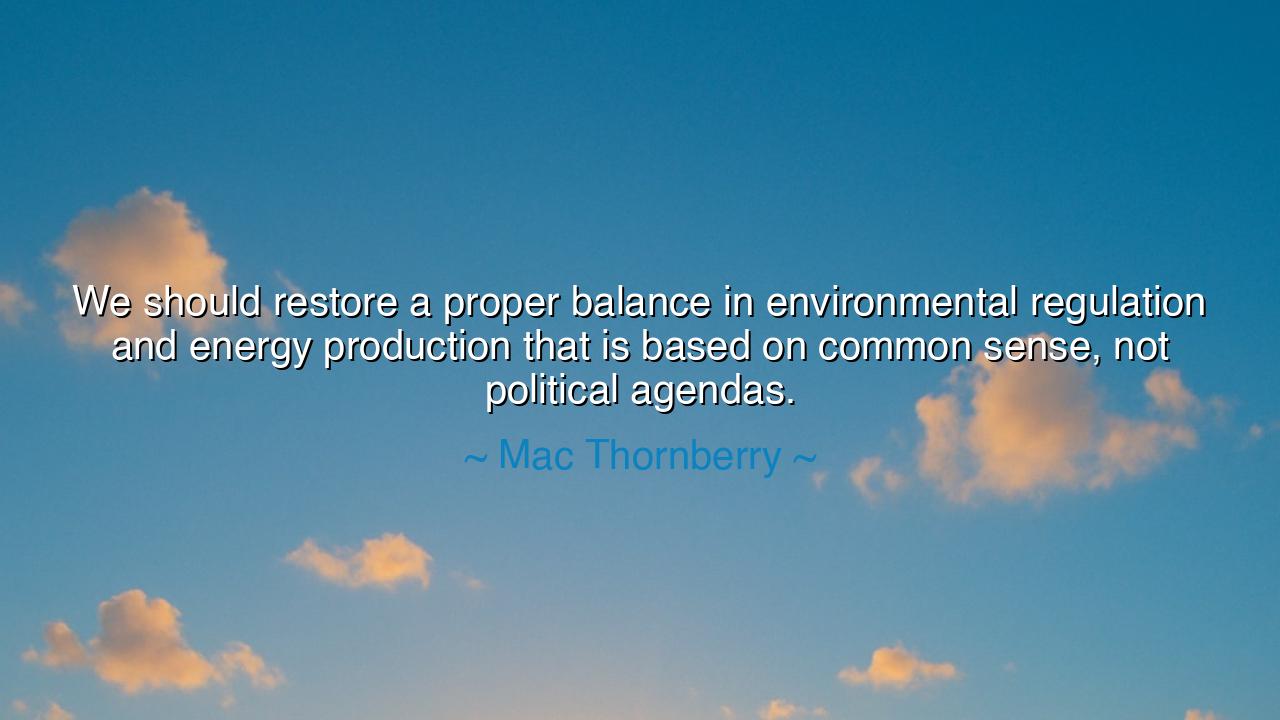
We should restore a proper balance in environmental regulation
We should restore a proper balance in environmental regulation and energy production that is based on common sense, not political agendas.






Hear now the words of Mac Thornberry, who once declared: “We should restore a proper balance in environmental regulation and energy production that is based on common sense, not political agendas.” This saying, though spoken in the chambers of policy, resounds with timeless weight. It speaks not only to lawmakers, but to all who walk the earth and consume its gifts. For within these words lies the eternal struggle of humankind: how to draw strength from nature without exhausting it, how to build power without breaking harmony, how to walk between plenty and preservation.
The call for balance is as old as civilization itself. When men first harnessed fire, they rejoiced in its warmth, but also learned the peril of unrestrained flame. So it is with energy production—whether from oil, coal, wind, or sun—it offers power for our cities, movement for our machines, and light for our nights. Yet without environmental regulation, the very hand that builds may also poison the rivers, choke the air, and desecrate the soil. Thornberry’s wisdom reminds us that the path forward must be neither reckless indulgence nor rigid obstruction, but a measured walk guided by common sense rather than the fleeting storms of political agendas.
Consider, O listener, the ancient tale of the Roman aqueducts. The Romans, mighty in engineering, brought water across valleys and mountains to sustain their cities. But they knew that to take without measure would drain the springs and wither the land. Thus they built laws to regulate usage, ensuring that the resource would endure. When later rulers abandoned this balance, when greed and neglect replaced stewardship, the aqueducts crumbled, and with them, the lifeblood of the cities they once nourished. So too shall our world falter if balance between energy and environment is lost.
Think also of the Dust Bowl of the 1930s in America. Farmers, driven by the hunger for more harvest, plowed the land without rest or restraint. For a time, it seemed prosperous, but soon the winds rose, carrying away the very soil upon which their hopes were planted. Crops failed, families fled, and despair swept the land. Only when conservation practices—crop rotation, windbreaks, and soil preservation—were embraced, did the earth begin to heal. This tragedy reveals the danger of allowing ambition or ideology to blind us to the wisdom of balance.
The emotional heart of Thornberry’s words lies in his call to common sense. For common sense is not bound by party or faction; it is the wisdom of mothers and fathers, the knowledge of farmers and craftsmen, the voice of experience whispering that excess, in any form, leads to ruin. To twist regulation into a weapon of political agendas is to forget that the earth does not serve one party or another. Its forests, waters, and winds are shared by all, and its destruction harms all alike.
The lesson, dear listener, is this: seek the middle path. Do not cry for boundless consumption in the name of progress, nor demand stagnation in the name of purity. Instead, weigh each choice as the ancients weighed gold upon the scales—measuring not only its weight, but its consequence. The power of nations depends upon energy, yet the endurance of nations depends upon stewardship of the environment. One without the other leads to downfall.
What then shall you do? First, live with awareness: conserve energy where you can, honor the earth with your choices, and do not waste. Second, hold leaders accountable, not for their allegiance to ideology, but for their allegiance to wisdom and balance. Third, practice the art of moderation in your own life, for as the soul governs the body, so do citizens govern the state by their example.
And remember always: the earth and its resources are not an inheritance from our ancestors alone—they are also a loan from our children. To restore balance is not merely a political act; it is a sacred duty, binding us across generations. Walk, then, in the spirit of common sense, and guard against the blindness of division. In this way, you will honor the wisdom of Thornberry’s words, and leave behind not ruin, but a world of endurance and harmony.






AAdministratorAdministrator
Welcome, honored guests. Please leave a comment, we will respond soon